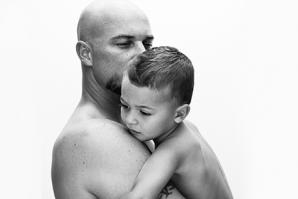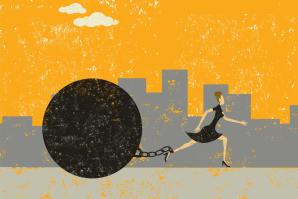Michael and Susan Pope had witnessed enough of parenthood to give them second thoughts about having children of their own. After seeing friends vanish into an abyss of diaper bags, sleepless nights, stress, arguments and the apparent loss of every conceivable freedom, they had plenty of reasons to reconsider.
Then the crash of 2008 started, the economy tanked and the Popes, now in their early 30s, had one more reason to stay childless: It would be good for their retirement planning.
“We’d pretty well decided we liked our lifestyle as it was already, before the recession hit,” Susan Pope says. “We had good jobs with promising careers, but neither of us wants to work into our 70s. As we saw what the economy was doing to the retirement plans of friends with children, we made a final decision not to have our own.”
The Popes are not an isolated example. A 2007 Pew survey found that one in five U.S. women — 20 percent — are staying childless, up from one in ten in 1960. More recently, a 2011 study by the National Center for Health Statistics showed Americans had fewer babies in each successive year after 2008, hitting a 12-year low in 2011.
Certainly, couples are basing their decisions on more than just the bank account. Starting a family is as much an emotional decision as anything else, but couples looking to have kids should know the economic implications. It’s not just about clothes and food until the child becomes independent.
The U.S. Department of Agriculture recently released a study suggesting the cost of raising a child born today through age 17 would be around $300,000. That’s up 23 percent from 1960. But the federal government’s conclusion may get a rise from parents. Key components, such as money for college, the cost of unpaid time spent parenting and the income forgone by parents who don’t work so they can provide child care, were not factored.
The actual cost is closer to $900,000, according to The Wall Journal. Even that figure, however, is based on minimum estimates for things like schooling, day care, clothing, toys, health care and so on. Given that we live in a culture where most parents want to provide more for their kids than they themselves had, it’s easy to assume most families spend more than the minimums. Include the need for a bigger home or a bigger car, and the cost jumps substantially. Add gassing up the Suburban and taking Johnny to his soccer game, then screaming across town for Sarah’s orthodontics appointment — both of which are also sucking money away — and a more realistic picture materializes.
One (childless) blogger for The New York Times estimated her real cost would be around $2 million per child after factoring in these elements, lost wages and loss of compound interest.
If Ben Franklin was right and a penny saved is a penny earned, then the opposite is also true. Two million dollars over 18 years is a huge hit to the nest egg.
“I think trying to retire early, especially in this economy, is going to be very tough even without kids,” says Dave Cox, vice president and certified financial planner with Hanson McClain. “Unless you’re financially very sound, retiring in your 50s is going to be difficult.”
There is a critical nuance in what Cox says. Retirement at 55 may not be realistic for couples with kids, but that doesn’t mean retirement is foregone all together. It’s just a question of when and whether you’re a spender or a saver.
“Saving for retirement and having a family are not mutually exclusive,” says Peter Scheid, senior vice president with Morgan Stanley. “I have three girls, all teenagers, so we need to think about college, weddings and our own retirement. That creates some anxiety. But when we started having children, we also decided to put some things in place so saving for those things could occur.”
That decision to “put things in place” is the foundational advice financial planners offer young couples considering kids. There are steps that can be taken to help ensure retirement remains an option.
The best news for young couples is that time is on their side. They can start saving early in their lives. If they do, it will make a huge difference in what their retirement savings looks like, thanks to the magic of compound interest.
“Having kids doesn’t need to prevent anyone from setting up a 401(k) or an IRA and trying to max it out every year,” Cox says, adding that the ideal scenario is one in which 10 to 15 percent of income is being socked away every month. “Even if you can’t contribute that amount to retirement, contribute some and get in the habit. If you can get used to a pattern of saving early, it’s less painful later. From there, it’s about the sacrifices and choices you’re willing to make along the way.”
Those sacrifices and choices aren’t much different from those of childless couples, who may not be spending their disposable income on Pampers and Easy Mac, but are spending it on travel, entertainment, dining out and luxury items. There’s no way of really knowing whether childless couples spend as much on themselves as parents spend on their kids, and staying childless is no guarantee that a comfortable retirement is in the bag. There’s even a school of thought that says parents use their money more wisely.
“From my experience, a decision to start a family actually makes people more effective at putting money away,” says Troy Miller, who worked as a financial planner in El Dorado Hills for 22 years before moving to Montana last year. “They know they’ve got long-term expenses coming, so they knuckle down earlier and start implementing a financial plan.”
Scheid agrees, saying Americans have been presented with an endless list of luxuries that blur the lines between want and need, and those things have a way of eating disposable income. Where couples with children must divert course from their childless counterparts is in putting disposable income into true necessities rather than luxuries. Specifically, financial planners all agree that anyone starting a family should set up solid insurance policies, in addition to savings plans. Medical coverage is a no-brainer, but parents should also have disability and life insurance policies that will take care of their families and pay for college if the worst happens to either or both of them.
For young couples starting out, that may not leave much cash lying around for fun, and that can be pretty depressing.
“You can’t let yourselves get overwhelmed by it all,” Scheid says. “You’re working toward a goal line that is decades away; you’re not going to get there all at once. It’s OK to struggle when you’re young if there’s a solid plan in place and important, long-term needs are being met.”
Miller adds that there’s no one-size-fits-all approach to retirement, and there are lots of products out there for individuals and couples in any scenario.
The notion that a decision about procreating is based exclusively on financial considerations is ludicrous, but if we’re going to stay in that realm, the “benefit” side of the equation must be considered.
That’s easier said than done, since the benefits — while very real — are almost entirely intangible. Last December, The Wall Street Journal quoted Lonnie Berger, an associate professor of social work at the University of Wisconsin, saying that parents may get tangible returns from their adult children in time, such as when the children become the caregivers of their parents. He also said cost estimates associated with child rearing don’t include any of the intrinsic benefits, such as personal satisfaction, happiness, pride and others that are, in Berger’s words, “extremely difficult to monetize.”
That’s a very academic way of saying there’s nothing like coming home from a long day at work to be tackled by your shrieking children. Or, as The Knack put it in 1980: “You can’t put a price on love.”
Recommended For You

Daddy Issues
Why aren't more men taking paternity leave?
On opening day of the 2014 baseball season, New York Mets second baseman Daniel Murphy was noticeably absent. He wasn’t benched. He didn’t have the flu. He simply took advantage of Major League Baseball’s paternity leave policy, which grants 72 hours off, to attend the birth of his son.
And all hell broke loose.

The Motherhood Penalty
Don't let parenthood stand in the way of pay raises and promotions
For women who fear facing financial or career penalties while parenting, it is important to be proactive. As with all career goals, the key is setting realistic expectations and communicating them effectively to others.



